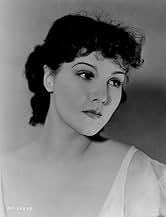Ajouter une intrigue dans votre langueHannah is so tight with her money that she takes her son, Donnie, to the charity ward a week after he hurts his leg. But she has always hoarded her money since her late husband wasted most o... Tout lireHannah is so tight with her money that she takes her son, Donnie, to the charity ward a week after he hurts his leg. But she has always hoarded her money since her late husband wasted most of it and now she plans to save it for Donnie. But when Donnie graduates from Princeton, he... Tout lireHannah is so tight with her money that she takes her son, Donnie, to the charity ward a week after he hurts his leg. But she has always hoarded her money since her late husband wasted most of it and now she plans to save it for Donnie. But when Donnie graduates from Princeton, he does not want to go into banking at Hannah's bank, he wants to be a writer, which upsets ... Tout lire
- Réalisation
- Scénario
- Casting principal
- Bank Clerk
- (non crédité)
- Miss Austin - Burton's Secretary
- (non crédité)
- Train Conductor
- (non crédité)
- Train Vendor
- (non crédité)
- Betsy - Kate's Maid
- (non crédité)
- Thomas - Bank Messenger
- (non crédité)
- Committee Man
- (non crédité)
- Woman at Graduation
- (non crédité)
Avis à la une
The rich person was Hannah Bell (May Robson), but you wouldn't know it. She was the tightest of tight wads, hence she looked poor. But like every tight wad, she was one because she loved money more than anything else except, maybe, her son Donny--but that was debatable. Hannah's attitude matched her appearance. She was coarse, hard, and difficult to get along with. Things had to be her way or no way and she was rich enough to where people would cater to her and put up with her nastiness.
As much as she loved money she hated John Burton (Lewis Stone). Why? We don't find out until the end. All we know is that she hated John Burton with every fiber of her being.
May only had money and her son, but she'd have to make a decision between the two when Donny (William Bakewell) decided he'd had enough of his mother and her greed.
What keeps you holding on and plugged into the movie is the mystery between Hannah and John. Was he responsible for what she'd become or was she like that before she even met him? I was dying to know.
May Robson is an excellent actress. She was the star in my favorite movie of the pre-code era, "Lady for a Day." She seemed right in her element playing a crabby old lady, but you know that there's something good under that rough exterior. So, as frustrated as I was with the old bitty, I had hope that I'd find out her story in the end.
Free on Odnoklassniki.
Le saviez-vous
- AnecdotesAccording to a contemporary article in the Motion Picture Herald, May Robson's character is based on Hetty Green (1834-1916), known as "The Witch of Wall Street," because of her financial acuity and frugality. During her career she was the richest woman in the United States, and was also known as "The Queen of Wall Street." She also had a daughter, but just her son was portrayed in this film.
Hetty Green was born in 1834 in New Bedford, Massachusetts to the richest whaling family in the city with a Quaker upbringing. She learned business basics at the knee of her father and grandfather. At 13, she became the family's bookkeeper and later helped manage her family's business. She was "the richest woman in America" during the Gilded Age."
She was an early proponent of empowered women, believing "It is the duty of every woman to learn to take care of her own business affairs," and "A girl should be brought up as to be able to make her own living..." "Whether rich or poor, a young woman should know how a bank account works, understand the composition of mortgages and bonds, and know the value of interest and how it accumulates." She predicted the Panic of 1907, was a well-established financier and "was the only woman invited to the critical meeting with J.P. Morgan and the leading banking executives at the height of the crisis."
Despite Hetty Green's exceptional investment instincts, discreet generosity, and admirable character, most media reports from the era (and soon thereafter) characterized her thrift as evidence of miserliness. The Guinness Book of World Records named her the "greatest miser." Stories that were often cited include her refusal to buy expensive clothes, pay for hot water, instructing her laundress to wash only the dirtiest parts of her dresses (the hems) to save money on soap, and her habit of wearing a single dress that was only replaced when it was worn out. Yet many of these habits were considered abnormal mainly because the Gilded Age was a time of celebrating excess rather than hiding it. When Hetty Green's life is evaluated in its entirety and in the context of the time period, it is clear that media criticism grossly misrepresented her true character.
- GaffesOn the streetcar, the conductor removes the transfer tickets from his pocket twice between shots.
- Citations
[last lines]
Mrs. Hannah Bell: Whose pneumonia is this? Yours or mine?
Meilleurs choix
Détails
- Date de sortie
- Pays d’origine
- Langues
- Aussi connu sous le nom de
- Old Hannibal
- Lieux de tournage
- Sociétés de production
- Voir plus de crédits d'entreprise sur IMDbPro
- Durée1 heure 22 minutes
- Couleur
- Rapport de forme
- 1.37 : 1
Contribuer à cette page































